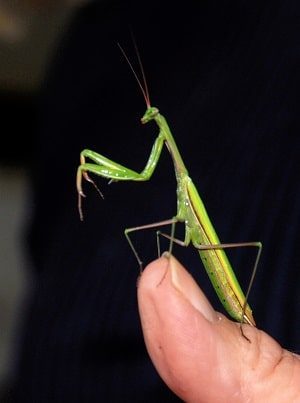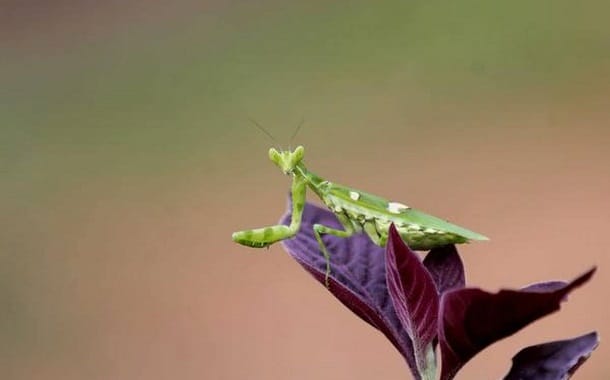How Much Does a Praying Mantis Cost?
Last Updated on February 6, 2024
Written by CPA Alec Pow | Content Reviewed by ![]() CFA Alexander Popinker
CFA Alexander Popinker
Owning an exotic pet like a praying mantis can be a unique and rewarding experience. But before bringing one of these fascinating insects home, it’s important to understand the costs involved with properly caring for them.
This article will provide an overview of praying mantis prices, initial setup requirements, and ongoing care expenses to help you budget for a new insect companion.
With their large eyes, triangle-shaped heads, and spiked front legs folded in a prayer-like stance, praying mantises have an alien-like appearance that captivates many pet owners.
Beyond their unique look, mantises exhibit complex hunting behaviors, transition through different life stages, and come in a variety of colors and sizes depending on the species. This range of diversity and their relatively simple care needs make them appealing for first-time and experienced insect enthusiasts alike.
How Much Does a Praying Mantis Cost?
The average cost of a praying mantis in the US ranges between $10-$30 for nymphs and $25-$50 for adults. However, prices can vary more widely depending on the rarity of the species, source of purchase, and insect’s age.
More exotic species cost more, while common starter species like the Carolina mantis are very affordable. Buying directly from a breeder is generally cheaper than a pet store. And newly hatched nymphs are less expensive than mature adults.
Some factors affecting praying mantis prices include:
- Species – Common species tend to be cheaper (under $20), while rare species can cost over $100.
- Size – Adults cost more than nymphs or young mantises.
- Source – Buying from a breeder is cheaper than a pet store.
- Legality – Species native to your area are easiest to acquire.
Here are some websites selling praying mantises and the prices they charge:
- Praying Mantis Egg Case (Ootheca): From $7.50 USD
- Praying Mantis Basic Kit with Egg Case: $34.50 USD
- Praying Mantis Living Juvenile: $12.50 USD, sale price $10.50 USD
- Praying Mantis Discovery Kit with Live Mantids: $49.50 USD
- Gift – Pop-Up 3D Mantis Greeting Card: $7.50 USD
- Wall Poster – Purple Flower Prayer: $42.00 USD
- Puzzle – 3D Paper Mantis Jigsaw Model: $8.50 USD
- Puzzle Jigsaw – Neon Sign Mantis: $68.00 USD
- Chinese Mantis (T. sinensis): From $12.99
- Hierodula Indonesia: $19.99
- Peruvian Leaf Mantis (P. Perpulchra): From $19.99
- 3 Praying Mantis egg cases: $18.95
- 5 Praying Mantis egg cases: $23.95
- 10 Praying Mantis egg cases: $33.95
- 15 Praying Mantis egg cases: $46.10
No matter your budget, there are mantis options available as pets. Doing research to select the right species for your experience level and needs is recommended.
Praying Mantises as Pets
There are over 2,000 different praying mantis species, but only a handful are commonly kept as pets. Some popular options include:
- Carolina Mantis – Native to North America and easy to care for. Vibrant green color. $10-$25 range.
- Chinese Mantis – Also green. Larger size at 4-5 inches long. $15-$35 range.
- Orchid Mantis – Beautiful pink coloration. More delicate. Rarer find. Up to $150.
- Ghost Mantis – White color blends into plants. Needs higher humidity. $25-$75 range.
These insectivores eat live prey like flies, crickets, and mealworms. They require a ventilated habitat like a mesh cage or terrarium, with branches, plants, and sticks for climbing and shedding. Proper temperature, humidity, lighting, and molting support should be provided.
With the right setup, praying mantises can live 6 months up to a year, with females tending to live longer than males. Taking the time to research and select the species best suited to your experience level and budget is key before making a purchase.
Factors Influencing Praying Mantis Costs
Prices for live praying mantis pets are influenced by a few important factors:
Species and Size
- Rare, brightly colored, or larger species are more expensive. Common green varieties are cheaper.
- Adults cost more than smaller nymphs and young mantises.
Source
- Buying from a breeder is cheaper than a pet store. Breeders often sell nymphs and young mantises for $10-$25.
- Pet stores offer convenience but often charge higher prices for adults and rarer species. $25-$75 range.
- Buying wild-caught native mantises is illegal in many states.
Legality
- Species native to your area are legal to own without permits. Exotics may require permits.
- Only buy from reputable, ethical sources that breed or legally import insects.
Doing research to select the right legal species for your budget and experience level is advised.
Initial Setup and Ongoing Care Costs
 The initial investment for housing and feeding a praying mantis averages $50 to $150. Ongoing monthly care costs are approximately $20 to $40. Breakdown of expenses:
The initial investment for housing and feeding a praying mantis averages $50 to $150. Ongoing monthly care costs are approximately $20 to $40. Breakdown of expenses:
Habitat Setup
- Enclosure – $20 to $60 for a mesh cage or glass terrarium (10+ gallons recommended).
- Substrate – $5 to $20 for soil, bark, and moss. Helps provide footing and humidity.
- Plants – $5 to $15 for plastic plants and sticks to climb on.
- Heating and lighting – $15 to $40 for special heating and UVB bulbs if needed.
- Humidity aids – $5 for a light misting bottle. $15 for a humidity gauge.
Total initial setup range: $50 to $150.
Also read our articles about owning a falcon, a cheetah, and lion cub.
Monthly Care Costs
- Food – $10 to $20 per month for live insects like crickets, flies, and roaches. Adults eat more.
- Supplements – $5 for calcium and vitamins to gut load feeder insects.
- Habitat maintenance – $5 for additional substrate, plants, and cleaning supplies as needed.
- Humidity and temperature – Electricity costs if heating and lighting is used.
Typical monthly costs: $20 to $40 per month.
Researching their needs and providing the right habitat is key to mantis health. Proper care has ongoing costs, so make sure to budget accordingly.
Where to Buy a Praying Mantis
Finding a legal, ethical source for purchasing praying mantises is recommended. Here are some options:
- Search for well-reviewed breeders online to buy captive-bred nymphs and young mantises legally. Often cheaper.
- Visit your local exotic pet store. Look for healthy, active insects. Higher prices likely.
- Reptile shows sometimes have insect vendors with mantis selection. Varies.
- Avoid wild-caught specimens. Only buy captive-bred insects.
Select a reputable source with proper breeding and care knowledge. Ask questions before purchasing to ensure a good match.
Conclusion
Praying mantises are fascinating exotic pets, but providing proper care has costs. With their unique features, behaviors, and needs, mantises offer a rewarding companion for insect enthusiasts who are prepared to give them a suitable habitat and diet.
By understanding the species variations, average prices, and setup requirements covered here, you can make an informed decision if a praying mantis is the right fit for your budget and lifestyle. With good planning and the right commitment, these intriguing insects can make for a wonderful pet experience.
Frequently Asked Questions
Can you buy a praying mantis as a pet?
Yes, praying mantises are legal to own as pets in most states. They are commonly bred and sold by insect breeders, exotic pet stores, and at reptile expos. Do research to select the right species for your experience level. Ensure the seller is reputable and obtains insects ethically and legally.
Is it legal to own a praying mantis?
It depends on the species and your state’s laws. Native species like the Carolina mantis can be owned without permits in most states. Exotic species may require permits or have restrictions. Check your local exotic pet laws. Only buy captive-bred insects from ethical, legal sources. Avoid any wild-caught specimens.
Do praying mantis bites hurt?
Praying mantis bites are not venomous or dangerous to humans. Larger species can give a painful pinch with their front legs if threatened, but they rarely bite humans handling them gently. Their bite could break skin but is more startling than harmful. Gentle handling minimizes any risk.


I can supply you with a lot of mantis
I’m looking for praying mantis.